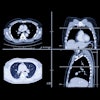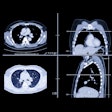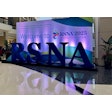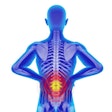At RSNA 2022, attendees will have the opportunity to take in new research and innovations in women's imaging, including sessions that highlight the increasing role of supplemental imaging modalities such as ultrasound and MRI, the growing power of artificial intelligence (AI), the continued rise of digital breast tomosynthesis in breast imaging practices, and more.
Presentations will highlight how contrast-enhanced mammography can be useful in follow-up imaging, how MRI can uncover more information about the effect of the COVID-19 vaccine on adenopathy, how insurance deductibles affect adherence to breast cancer screening, and how photon-counting CT and molecular imaging show potential in breast imaging applications.
AI once again takes center stage as research continues to highlight its potential in breast imaging. Researchers presenting at the RSNA will show the technology's use as a triage tool, as well as alongside radiologists for analyzing suspicious imaging findings. The goal is to reduce workloads and improve cancer detection.
Breast density and its ties to breast cancer risk will be explored too, with its challenging impact on cancer detection and imaging performance to be scrutinized. Researchers at RSNA will also make the case that breast density needs to be better assessed and accounted for in breast cancer screening.
In addition, RSNA 2022 will feature educational courses, both in-person and on-demand, for radiologists of all experience levels on a myriad of topics within breast imaging. The sessions will cover topics such as the best use of AI in clinical practice, molecular subtypes of breast cancer, patient treatment management practices, health disparities and health equity, abbreviated imaging workflows, and emerging technologies, among others. Poster presentations will also be showcased.
Keep reading for highlights of just some of the many presentations scheduled for this year's meeting. You can also access the complete scientific and educational program on the RSNA 2022 website.
FDG-PET/MRI can guide breast cancer therapy changes
Sunday, November 27 | 9:00 a.m.-9:30 a.m. | S1-STCE-3 | Learning Center Theater
In this talk, researchers will discuss how F-18 FDG-PET/MRI leads to therapy changes in breast cancer patients with elevated pretest probability for distant metastases.
CEM, abbreviated MRI square off in breast screening
Sunday, November 27 | 10:30 a.m.-11:30 a.m. | S2-SSBR01-3 | Room E450B
Contrast-enhanced mammography (CEM) and abbreviated MRI have tradeoffs when it comes to supplemental breast cancer screening, suggests research to be presented at the RSNA annual meeting.
Can contrast-enhanced mammo outperform DBT in cancer detection?
Sunday, November 27 | 10:30 a.m.-11:30 a.m. | S2-SSBR01-2 | Room E450B
Researchers will demonstrate how contrast-enhanced mammography is superior to digital breast tomosynthesis (DBT) when it comes to detecting early, mostly invasive breast cancer in women with a personal history of breast cancer.
MRI analyzes adenopathy in women vaccinated for COVID-19
Sunday, November 27 | 2:30 p.m.-3:30 p.m. | S5-SSBR02-4 | Room E450B
Breast MRI used on women who present with axillary adenopathy after receiving the COVID-19 vaccination have a low malignancy rate, according to a report to be presented in this session.
Breast density confounds breast screening programs
Monday, November 28 | 1:30 p.m.-2:30 p.m. | M6-SSBR04-1 | Room E451A
Increasing mammographic breast density decreases the overall performance of breast cancer screening, but supplemental imaging may help, according to this talk.
How good is photon-counting CT in breast imaging?
Tuesday, November 29 | 9:30 a.m.-10:30 a.m. | T3-SSPH07-4 | Room S402
In this session, photon-counting CT's potential in breast imaging will be discussed, with research suggesting it has similar image quality to dedicated breast CT.
Deductible payments discourage breast imaging for women
Tuesday, November 29 | 3:00 p.m.-4:00 p.m. | T7-SSBR06-3 | Room E451B
In this session, a study will highlight how high-deductible health insurance plans discourage over one in five women from returning for diagnostic workup, as well as nearly the same number of women to skip screening altogether.
Can DBT serve as a safety net in breast cancer screening?
Wednesday, November 30 | 9:30 a.m.-10:30 a.m. | W3-SSBR08-6 | Room E451B
The utility of digital breast tomosynthesis (DBT) as a "safety net" in breast cancer screening will be discussed in this presentation, including its impact on cancer outcomes.
DCE-MRI predicts pathologic response in breast cancer treatment
Wednesday, November 30 | 3:00 p.m.-4:00 p.m. | W7-SSBR09-3 | Room E451B
In this talk, researchers will demonstrate how initial ultrafast dynamic contrast-enhanced MRI (DCE-MRI) can aid in predicting complete pathologic response in breast cancer patients.
Which radiotracer is best for preoperative lymph node assessment?
Wednesday, November 30 | 3:00 p.m.-4:00 p.m. | W7-SSBR09-2 | Room E451B
In this scientific talk, researchers will compare the performance of F-18 FDG and F-18 fluoroethylcholine in preoperative lymph node assessment of breast cancer patients on PET/MRI.




















